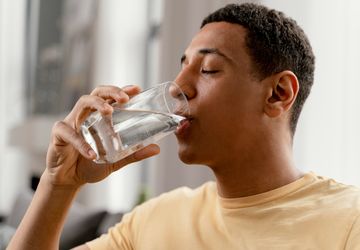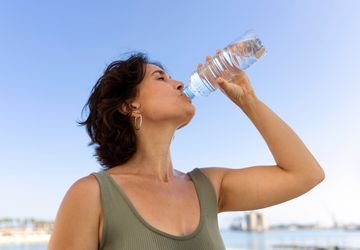Consumption of fluid is important for overall health and well-being, but it is especially important while you are trying to shed some pounds. Imbibing fluid is important for maintaining numerous organic reactions and optimizing metabolism, which can help with effective strategies to shed some pounds. In this article, we will discuss the significance of remaining full of water and offer practical advice on how to stay full of water for weight reduction success.
The Link Between Hydration and Weight Reduction

Proper consumption of fluid is not only vital for overall health, but it also helps with shedding some pounds attempts. It is beverage free from sugars that can aid in shedding some pounds and enhance feelings of contentment. Understanding the relationship between water intake and weight reduction allows you to harness the power of appropriate water intake to reach your weight reduction objectives.
● Water and Calorie Intake:
One of the most important ways water intakes affects weight reduction is through its effect on calorie intake. Soda, fruit juices, and energy drinks are all rich in calories and can contribute to weight gain. You may dramatically lower your overall calorie consumption by swapping water for these calorie-dense beverages. Fluid also aids with appetite management. Having enough water might help you avoid unhealthy snacking and overeating.
● Metabolism and Water Intake
water intake is intimately related to metabolic rate, which is the number of calories your body burns at rest. According to research, even slight dewater intake might cause a drop-in metabolic rate. When you're deprived of fluid, your body's capacity to burn fluid effectively reduces, which might stymie your shed pounds attempts. You can assist your metabolism and ensure that your body functions correctly by remaining full of water.
● Reduces Water Retention
Staying full of water might, paradoxically, assist in preventing water retention and bloating. When the body is properly full of water, it is less prone to retain extra water weight. This might give you a leaner appearance and aid in weight management.
● Improves Aerobic Performance
Consumption of fluid is critical for good aerobic performance. When you're well full of water, you have greater energy and endurance, allowing you to work out for longer and harder. Exercise helps you lose weight by burning calories and increasing lean muscular mass.
● Promotes Detoxification
Fluid consumption aids in detoxification by eliminating toxins and waste products from the body through micturation. Consuming fluids promotes kidney function, which is in charge of filtering waste and maintaining the homeostasis. Water promotes cleansing, which aids in general health and weight reduction.
● The Effect of Water on Digestion and Nutrient Absorption

Proper fluid consumption is necessary for peroper digestion and nutrient absorption. It assists in the breakdown and transportation of food through the digestive system. Adequate consumption of fluid encourages regular bowel movements and aids in the prevention of constipation, which can be a problem during weight reduction. When your digestive system is working properly, it can help you maintain a healthy weight.
● Promotes Feelings of Fullness
Consuming fluid before meals can assist in promoting a sensation of fullness, which can lead to less sugar consumption throughout the meal. This can help with shedding some pounds by avoiding overeating and encouraging portion management.
Incorporating Water Intake into Your Weight Reduction Journey
To make water intake a priority during your weight reduction journey, consider the following tips:
● Monitor Fluid Intake
It is critical to keep track of your water consumption to ensure you are fulfilling your daily water intake needs. While the recommended daily consumption of fluid varies according to the age, activity level, and lifestyle. A basic rule of thumb is to consume at least 64 ounces of fluid every day. Individual needs vary, so pay attention to your body's signals and adapt your fluid consumption accordingly.
● Fluid-Friendly Foods
You may enhance your consumption of fluid by integrating cirtus fruits and vegetables into your meals and snacks in addition to consuming fluids. Cucumbers, melons, strawberries, oranges, and leafy greens are examples. These meals not only increase your consumption of fluid but also give critical vitamins, essential minerals, and roughage to help you shed some pounds.
● Water Intake Strategies for Exercise
It is critical to maintain optimum water intake levels when participating in physical exercise. Hydrate prior to, during, and after exercise to replace fluids lost through perspiration. Drink plenty of water or electrolyte-rich drinks to stay full of water. Electrolytes, such as sodium and potassium, assist your body in maintaining fluid balance and promote healthy muscular performance.
● Set Water Intake Reminders

It's easy to forget to consume enough fluid during the day, especially if you're busy or don't feel like having. Setting reminders can assist you in developing a regimen and ensuring constant consumption of fluid. To remind yourself to have fluid at regular intervals, you may use smartphone apps or alarm clocks.
● Personalize Your Water Intake Routine
Everyone's fluid intake requirements differ depending on factors such as the mass of body, level of aerobic activity, and environment. Take note of your body requirements and modify your intake of fluid accordingly. If you are participating in heavy physical aerobic activity, you may need to increase your consumption of fluid to compensate for the extra loss of fluid.
● Make Water Intake Fun
Some individuals find it difficult to drink plain water throughout the day. If you struggle with this, try infusing water with fruits, herbs, or even a dash of lemon or lime juice to make it more palatable. Herbal teas and flavored water are other viable solutions for increasing your water intake consumption.
Conclusion
Maintaining sufficient amount of fluid is not only vital for overall health, but it also plays an important part in sheddin some pounds. You can enhance your bodily natural processes and optimize your efforts by knowing the link between fluid intake and shedding pounds and following practical techniques to be appropriately full of water. Remember to keep track of your fluid intake, and prioritize it when aerobic exercising.
